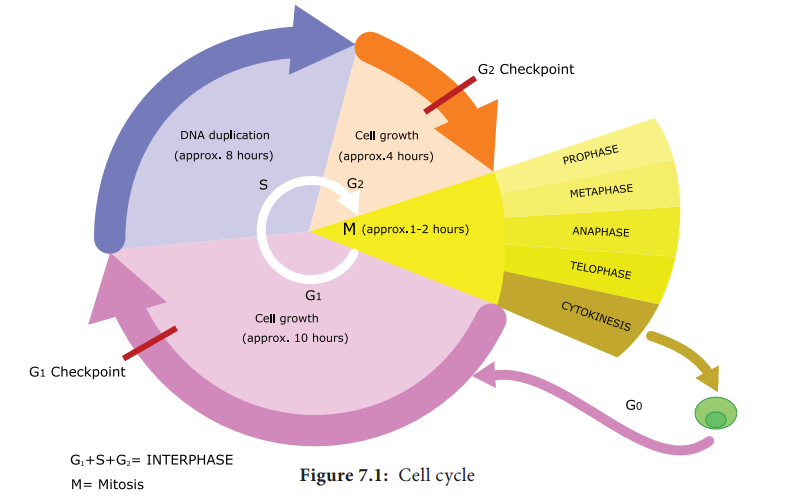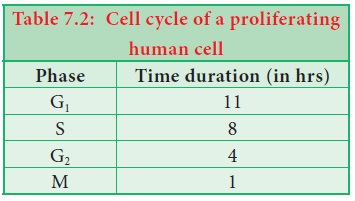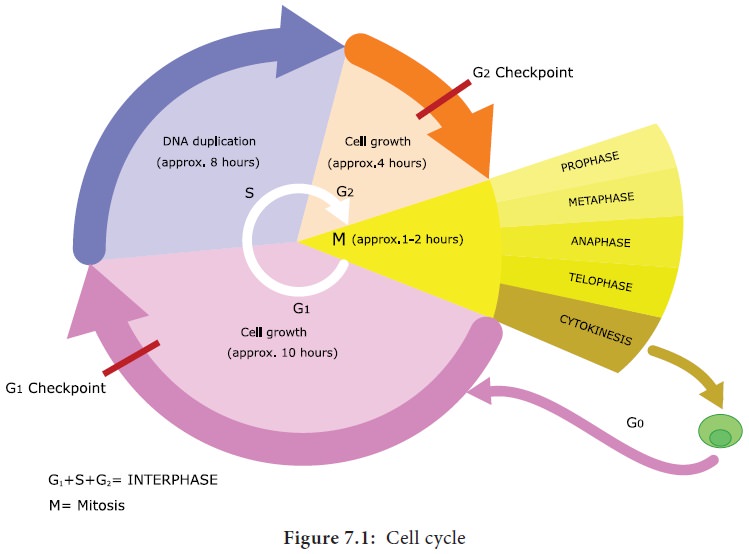Definition, Phases, Duration - Cell Cycle | 11th Botany : Chapter 7 : Cell Cycle
Chapter: 11th Botany : Chapter 7 : Cell Cycle
Cell Cycle

Cell Cycle
Definition:
A series
of events leading to the formation
of new cell is known as cell cycle. The phenomenonal changes leading to formation of new population take
place in the cell cycle. It was discovered by Prevost and Dumans (1824).
The series of events include several
phases.
1. Duration of Cell Cycle
![]()
![]()
![]()
Different kinds of cells have varied duration for
cell cycle phases. Eukaryotic cell divides every 24 hours. The cell cycle is
divided into mitosis and interphase. In cell cycle 95% is spent for interphase whereas
the mitosis and cytokinesis last only for an hour.

The different phases of cell cycle are as follows
(Figure 7.1).

2. Interphase
Longest part of the cell cycle, but it is of
extremely variable length. At first glance the nucleus appears to be resting
but this is not the case at all. The chromosomes previously visible as thread
like structure, have dispersed. Now they are actively involved in protein
synthesis, at least for most of the interphase.
C- Value is the amount in picograms
of DNA contained within a haploid nucleus.
3. G1 Phase
The first gap phase – 2C amount of DNA in cells of G1. The cells become metabolically active and grows by producing proteins, lipids, carbohydrates and cell organelles including mitochondria and endoplasmic reticulum. Many checkpoints control the cell cycle.
The checkpoint called the restriction point at the end of G1,
determines a cells fate whether it will continue in the cell cycle and divide
or enter a stage called G0
as a quiescent stage and probably as specified cell or die. Cells are arrested
in G1 due to:
•
Nutrient deprivation
•
Lack of growth factors or density dependant
inhibition
•
Undergo metabolic changes and enter into G0
state.
Biochemicals inside cells activates the cell
division. The proteins called kinases
and cyclins activate genes and their proteins to perform cell division. Cyclins
act as major checkpoint which operates in G1 to determine whether or
not a cell divides.
4. G0 Phase
Some cells exit G1 and enters a
quiescent stage called G0,
where the cells remain metabolically active without proliferation. Cells can
exist for long periods in G0 phase. In G0 cells cease
growth with reduced rate of RNA and protein synthesis. The G0 phase
is not permanent . Mature neuron and
skeletal muscle cell remain permanently in G0. Many cells in animals
remains in G0 unless called on to proliferate by appropriate growth
factors or other extracellular signals. G0
cells are not dormant.
5. S phase – Synthesis phase – cells with intermediate amounts of DNA.
Growth of the cell continues as replication of DNA
occur, protein molecules called histones
are synthesised and attach to the
DNA. The centrioles duplicate in the cytoplasm. DNA content increases from 2C
to 4C.
6. G2 – The second Gap phase – 4C amount of DNA in cells of G2 and mitosis
Cell growth continues by protein and cell organelle
synthesis, mitochondria and chloroplasts divide. DNA content remains as 4C.
Tubulin is synthesised and microtubules are formed. Microtubles organise to
form spindle fibre. The spindle begins to form and nuclear division follows.
One of the proteins synthesized only in the G2
period is known as Maturation Promoting Factor (MPF). It brings about condensation of interphase chromosomes
into the mitotic form.
DNA damage checkpoints operates in G1 S
and G2 phases of the cell cycle.
Related Topics